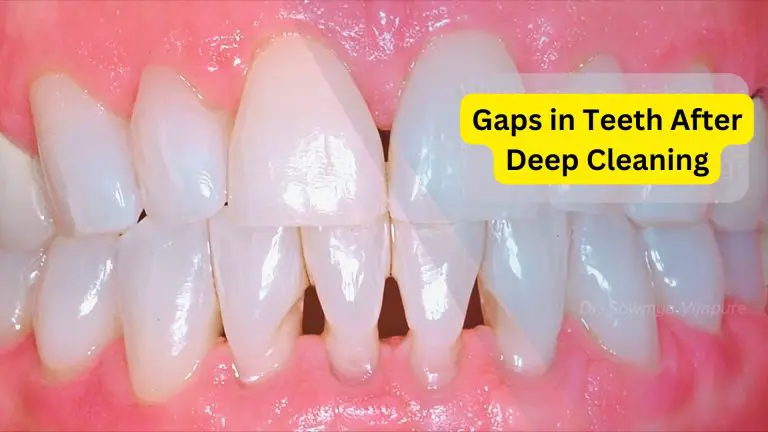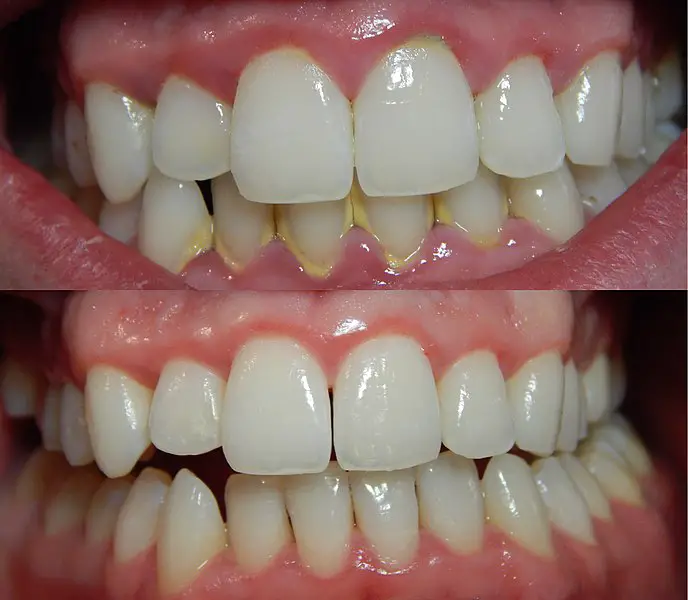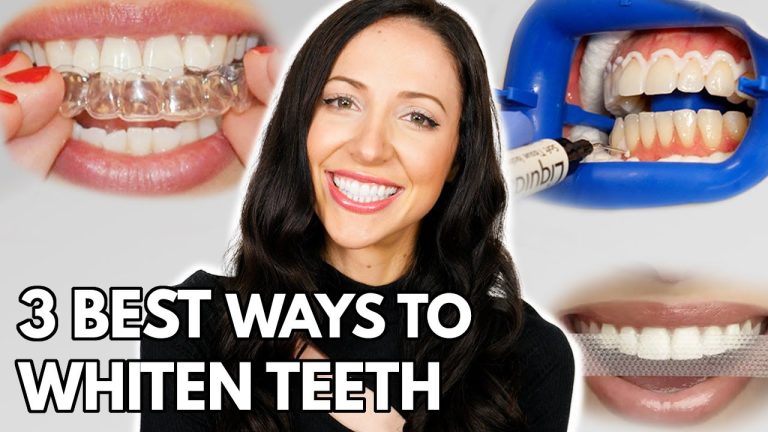Last Updated on 3 weeks by DR. ALBIN SIPES
To whiten sensitive teeth naturally, you can use gentle whitening toothpaste or apply a paste made from baking soda and water. Having a bright, white smile is something many people desire, but if you have sensitive teeth, traditional whitening methods may cause discomfort.
Fortunately, there are natural ways to whiten your teeth without aggravating sensitivity. One option is to use a toothpaste specifically designed for sensitive teeth that also has whitening properties. These toothpastes contain gentle ingredients that won’t irritate your teeth while still effectively removing stains.
Another natural method is to create a paste using baking soda and water. Baking soda is a mild abrasive that can help remove surface stains, but it is important to only use this method sparingly and with caution. By incorporating these natural methods into your oral care routine, you can achieve a whiter smile while keeping your sensitive teeth happy.
What Causes Tooth Sensitivity?
Tooth sensitivity can be caused by enamel erosion, gum recession, and teeth grinding. Enamel erosion occurs when the protective outer layer of the tooth gradually wears away. Gum recession happens when the gum tissue pulls back from the tooth, exposing the sensitive roots.
Teeth grinding or clenching, also known as bruxism, can wear down the enamel and make the teeth more susceptible to sensitivity. These conditions can lead to discomfort when consuming hot or cold foods and drinks, acidic beverages, or even when breathing in cold air.
Thankfully, there are natural remedies that can help whiten sensitive teeth, such as using a soft-bristled toothbrush and desensitizing toothpaste. Additionally, avoiding harsh whitening products and maintaining good oral hygiene practices can help alleviate sensitivity over time. By understanding the causes of tooth sensitivity and adopting natural remedies, it is possible to improve the condition of sensitive teeth and achieve a brighter, healthier smile.
The Impact Of Tooth Sensitivity On Daily Life
Tooth sensitivity can significantly impact daily life due to the challenges it presents. Difficulty eating and drinking can make meal times uncomfortable and frustrating. Maintaining proper oral hygiene becomes a challenge, as brushing and flossing can cause discomfort. The consequences of tooth sensitivity extend beyond basic daily activities and can adversely affect overall dental health.
Therefore, finding natural ways to whiten sensitive teeth is crucial. By adhering to these instructions, you will discover effective methods to whiten your teeth naturally, improving your oral health and overall quality of life. So let’s dive into the techniques that can help alleviate tooth sensitivity and restore your confident smile without relying on harsh chemicals or expensive dental treatments.
Maintaining Proper Oral Hygiene
Maintaining proper oral hygiene is essential to whiten sensitive teeth naturally. Brushing with a soft-bristled toothbrush helps prevent further damage. Using a desensitizing toothpaste can provide relief and protect tooth enamel. Flossing regularly removes plaque and debris, promoting healthier teeth and gums.
Remember to brush gently, avoiding aggressive scrubbing that can worsen sensitivity. Additionally, consider avoiding acidic and staining foods to minimize discoloration.
Incorporating Teeth-Friendly Foods Into Your Diet
Incorporating teeth-friendly foods into your diet can naturally whiten sensitive teeth. Crunchy fruits and vegetables, such as apples and carrots, can help remove stains from teeth. Dairy products like cheese and yogurt are rich in calcium, which strengthens tooth enamel.
Green tea contains catechins that fight bacteria and reduce inflammation in the mouth. These teeth-friendly foods are a natural way to improve the whiteness of your teeth without causing sensitivity. By including them in your daily diet, you can enhance your oral health and achieve a brighter smile.
Make sure to brush your teeth regularly and visit your dentist for professional advice and treatment options. Taking care of your teeth from the inside out is essential for maintaining their whiteness and overall health.
Limiting Harmful Habits
Limit harmful habits by avoiding acidic foods and drinks, which can erode tooth enamel. Quitting smoking also helps to prevent tooth discoloration. Additionally, reducing consumption of staining beverages like coffee and red wine can make a significant difference in whitening sensitive teeth naturally.
By following these simple steps, you can protect your teeth and maintain their natural brightness. Moreover, it is essential to brush your teeth gently with a soft-bristled toothbrush and use a toothpaste specifically designed for sensitive teeth. Furthermore, regular dental check-ups and professional cleanings are vital to ensure optimal oral health.
In this blog post, we provide practical tips and advice to help you achieve a brighter, whiter smile without causing additional sensitivity. Follow these guidelines to whiten your teeth naturally and enjoy a healthy, confident smile.
Oil Pulling
Oil pulling with coconut oil is a natural method to whiten sensitive teeth. The swishing technique helps to remove stains and bacteria. It is recommended to perform oil pulling for about 10-15 minutes every day. The frequency can be adjusted based on individual preferences and sensitivity.
This ancient practice not only whitens teeth but also improves oral health. Coconut oil has antimicrobial properties that help to combat harmful bacteria in the mouth. Oil pulling has gained popularity as an effective and affordable alternative to chemical teeth whitening treatments.
By incorporating this simple routine into your daily oral hygiene regimen, you can achieve a brighter smile without causing further sensitivity to your teeth.
Baking Soda And Hydrogen Peroxide
Whitening sensitive teeth naturally can be achieved with the help of baking soda and hydrogen peroxide. Making a paste by combining these two ingredients is a common method. To apply the paste, gently brush it onto your teeth for a few minutes.
However, it is important to take safety precautions when using this method. Make sure to avoid swallowing the mixture and rinse your mouth thoroughly afterwards. Additionally, limit the frequency of this treatment to a few times a week to prevent any potential damage to your enamel.
By following these guidelines, you can effectively whiten your sensitive teeth without causing any harm.
Activated Charcoal
Activated charcoal is a popular natural remedy for whitening sensitive teeth. Brushing with activated charcoal can help remove surface stains from teeth. It is important to use it in moderation, only a few times a week, due to its abrasive nature.
However, using it for an extended period of time or too frequently may lead to enamel erosion. It is also advisable to be cautious when using activated charcoal if you have any dental restorations, as it may stain them. Additionally, some individuals may experience side effects such as increased tooth sensitivity or irritated gums.
Therefore, it is recommended to consult with a dentist before incorporating activated charcoal into your oral care routine.
Regular Dental Check-Ups
Regular dental check-ups are crucial for maintaining oral health and preventing tooth sensitivity. These appointments enable dental professionals to identify and address underlying dental issues that may be causing sensitivity. By regularly visiting the dentist, individuals can receive professional cleanings that remove plaque, tartar, and stains, which can contribute to tooth sensitivity.
Dental professionals can also offer advice on proper oral hygiene techniques and suggest appropriate products for sensitive teeth. Following their guidance and using gentle whitening remedies such as baking soda, hydrogen peroxide, or activated charcoal can naturally whiten sensitive teeth.
Remember, a healthy smile starts with regular dental check-ups and professional cleanings to address any dental issues that may be causing sensitivity.
Using Teeth Whitening Products With Caution
Using teeth whitening products with caution is essential for individuals with sensitive teeth. Over-the-counter whitening kits are readily available, but it’s important to be aware of potential risks and side effects. Professional teeth whitening treatments are a safer option, as they are performed by trained professionals who can adjust the treatment to suit your specific needs.
However, it’s still important to follow the instructions carefully and avoid excessive use that could result in tooth sensitivity or damage. Regularly consulting with a dentist can help ensure that you choose the right teeth whitening method for your sensitive teeth.
Ultimately, natural teeth whitening remedies may be a gentler alternative, such as using baking soda, hydrogen peroxide, or brushing with a toothpaste specifically designed for sensitive teeth. By being cautious and mindful of your sensitive teeth, you can achieve a brighter smile naturally.
Maintaining Long-Term Results
Maintaining long-term results after whitening sensitive teeth naturally requires consistency with your oral care routine. This means following a regular brushing, flossing, and rinsing routine to keep your teeth bright and healthy. Lifestyle changes can also contribute to the longevity of your whitening results, such as avoiding food and drinks that stain your teeth, like coffee and red wine.
Additionally, touch-up treatments can help maintain the whiteness of your teeth over time. These treatments can be done at home using whitening products or at the dentist’s office. By incorporating these practices into your oral care regimen, you can enjoy the benefits of naturally whiter teeth for the long term.
Frequently Asked Questions On How To Whiten Sensitive Teeth Naturally
How Can I Naturally Whiten Sensitive Teeth?
To naturally whiten sensitive teeth, you can try brushing with baking soda, using hydrogen peroxide as a mouthwash, or applying a homemade whitening paste of lemon juice and strawberry pulp. These methods are gentle and can help lighten the color of your teeth without causing sensitivity.
Are There Any Natural Remedies For Tooth Sensitivity?
Yes, there are natural remedies for tooth sensitivity. You can try using desensitizing toothpaste containing potassium nitrate, rinsing your mouth with a saltwater solution, or applying a clove oil compress to the affected area. These remedies can help alleviate sensitivity and provide relief.
Can Diet Contribute To Tooth Sensitivity?
Yes, diet can contribute to tooth sensitivity. Consuming acidic foods and drinks, such as citrus fruits, soda, or wine, can wear down the tooth enamel and expose the sensitive dentin underneath. It is important to limit acidic food and drink consumption to prevent worsening of tooth sensitivity.
How Often Should I Brush My Sensitive Teeth?
You should brush your sensitive teeth at least twice a day, using a soft-bristled toothbrush and a toothpaste specifically designed for sensitive teeth. Avoid aggressive brushing and use gentle, circular motions. It is also important to replace your toothbrush every three to four months or when the bristles become frayed.
Can Sensitivity Toothpaste Help Whiten My Teeth?
Sensitivity toothpaste can help whiten your teeth up to a certain extent. While its primary purpose is to alleviate tooth sensitivity, some sensitivity toothpaste brands also contain whitening ingredients that can gradually lighten the color of your teeth. However, for more significant whitening results, you may need to explore additional whitening options like professional treatments.
Conclusion
Whitening sensitive teeth naturally is not only possible but also beneficial for your oral health. By incorporating simple and inexpensive remedies into your daily routine, you can effectively reduce tooth sensitivity and achieve a brighter smile. From practicing good oral hygiene habits and avoiding certain food and drinks that stain your teeth, to trying natural remedies such as baking soda, hydrogen peroxide, and oil pulling, there are various methods to choose from.
It is important to remember that patience and consistency are key, as natural remedies may take time to show noticeable results. Prioritize the well-being of your teeth by consulting with a dentist and following their advice before trying any diy remedies.
With the right approach, you can safely whiten your teeth and regain your confidence in flashing a sparkling smile.







